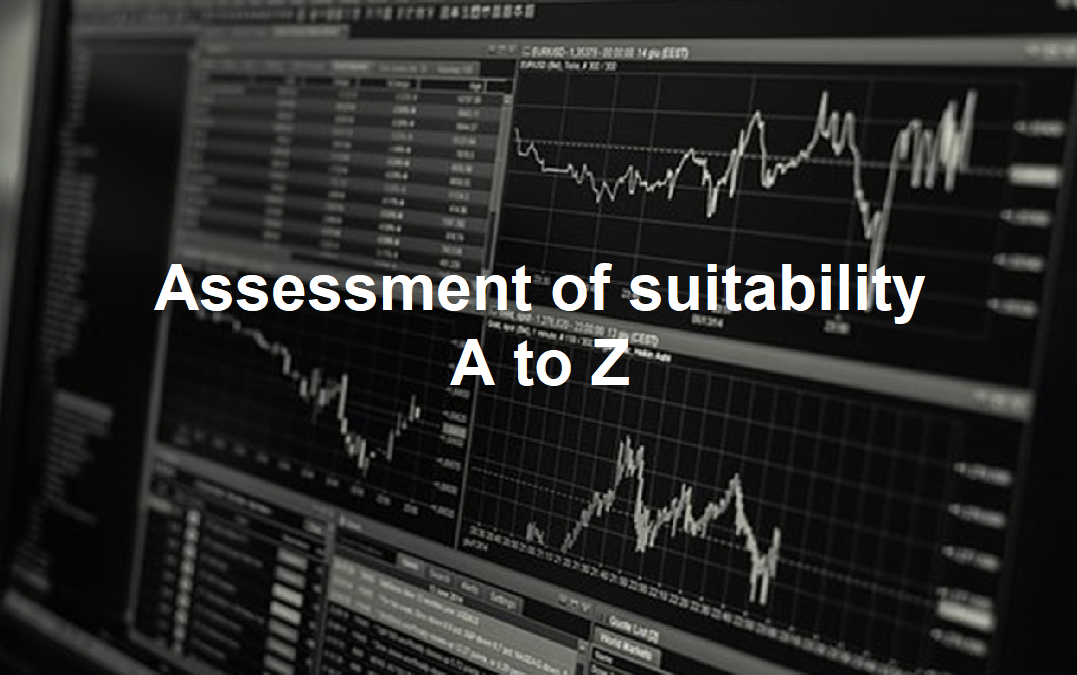5 CPD
Course Description
This course analyses the requirements that MiFID II and MiFID II Delegated Regulation place on investment firms when they provide investment advice or discretionary portfolio management services. These include requirements to ensure that (when providing advice) any personal recommendations made or (when providing discretionary portfolio management services) any discretionary investment decisions taken on behalf of clients are suitable for each client.
It provides details of the requirements regarding information to be obtained when assessing suitability. When providing investment advice or portfolio management the investment firm must obtain the necessary information regarding the client’s or potential client’s knowledge and experience in the investment field relevant to the specific type of product or service, that person’s financial situation including his ability to bear losses, and his investment objectives including his risk tolerance so as to enable the investment firm to recommend to the client or potential client the investment services and financial instruments that are suitable for him and, in particular, that are in accordance with his risk tolerance and ability to bear losses.
The investment firm shall ensure that the information regarding a client’s or potential client’s knowledge and experience in the investment field includes, to the extent appropriate to the nature of the client, the nature and extent of the service to be provided and the type of product or transaction envisaged, including their complexity and the risks involved: (a) the types of service, transaction and financial instrument with which the client is familiar; (b) the nature, volume, and frequency of the client’s transactions in financial instruments and the period over which they have been carried out; (c) the level of education, and profession or relevant former profession of the client or potential client.
When providing investment advice, the Company shall, before the transaction is made, provide the client with a statement on suitability in a durable medium specifying the advice given and how that advice meets the preferences, objectives and other characteristics of the retail client.
This course also analyses 16 basic principles that investment firms should apply when contacting suitability assessment and providing suitability reports to clients. In addition describes good practices that investment firms can apply when assessing client’s knowledge; good practices regarding investment objectives, risk tolerance, the methods for collecting and updating client information, the content of the suitability report following personalised recommendation, Compliance control system as well as a number of other good practices.
Furthermore, this course explains General Guidelines that investment firms should apply, like information to clients about the purpose of the suitability assessment, Know Your Client and Know Your Product, matching clients with suitable products, as well as other requirements.
Topics covered
The course is split into the following sections:
Section 1: Brief summary of the applicable legislation
- MiFID II and the MiFID II Delegated Regulation requirements
- The Company should be able to demonstrate to the regulator …
- Collection of required information
- Necessary information for assessment of suitability
- Any kind of knowledge and experience?
- Switching of financial instruments
- Keep proper records
- Provision of reports to clients
- Investment advice – statement on suitability
Section 2: Assessment of suitability and suitability reports – 16 Basic principles
- Do not create any ambiguity
- Determine the extent of the information to be collected
- Specific assumptions for professional clients
- Information regarding the financial situation
- Information regarding investment objectives
- Who should be subject to the suitability assessment in case of legal person or group of two or more natural persons
- Ensure reliability of the collected information
- Do not provide investment advice or portfolio management if you have not obtained the required information
- Have in place, and be able to demonstrate, adequate policies and procedures
- Do not recommend or trade when not passing the suitability test
- When switching investments undertake an analysis of the costs and benefits of the switch
- Review the suitability of the recommendations given at least annually
- Responsibility for undertaking suitability assessment when services are provided through an automated system
- When suitability assessment should be undertaken?
- When a transaction may be unsuitable for the client?
Section 3: Good Practices
- Good Practices regarding assessment of client’s knowledge
- Good practices regarding investment objectives
- Good practices regarding risk tolerance
- Good practices regarding the methods for collecting and updating client information
- Good practices regarding the content of the suitability report following personalised recommendation
- Good practices regarding Compliance control system
- Other Good practices
Section 4: Guidelines on certain aspects of the MiFID II suitability requirements
- Information to clients about the purpose of the suitability assessment
- Know Your Client and Know Your Product
- Matching clients with suitable products
- Other related requirements
Section 5: Questions and Answers on suitability
- Does the suitability report only have to be provided if the investment advice leads to a transaction?
- Shall the suitability report contain the record of when the investment advice is given to the client?
- Can the suitability report be made available to the client on the firm’s website, with the client receiving a notification (via email or through any other means of communication) regarding the availability of this document?
- Can the suitability report be sent together with the report due when carrying out an order on behalf of a client other than for portfolio management?
- Shall a suitability report be provided to the client when the advice given is not to buy or sell a financial instrument?
- What are the obligations on a firm when a specific financial instrument is unsuitable for a client, in particular also in situations when the client wishes to proceed with the transaction nonetheless?
- When a firm provides the investment service of advice or portfolio management to a client who is unwilling to fully disclose information on his/her financial situation, can the firm assess the suitability of the envisaged transaction? If yes, under which conditions?
- Where a firm is subject to several record keeping and documentation obligations in connection with the provision of investment advice, is the firm required to draft distinct documents or would one document containing the requirements of all of these different documents be sufficient?
- Are investment firms allowed to use a tick-the-box approach and/or generalizing phrases when stating how the advice meets the retail client’s preferences, objectives and other characteristics in the suitability report?
Course Duration:
This course may take up to 5 hours to be completed. However, actual study time differs as each learner uses their own training pace.
The course is addressed to:
This course is addressed to all individuals who are involved in Investment Firms (forex, brokers, etc) such as:
- Executive Directors, Non executive directors, Senior Managers, Compliance officers, head of portfolio management department, head of investment advice department, head of departments of Investment firms and in general employees of investment firms.
- Internal Auditors
- Consultants
It is also suitable to professionals pursuing CPD for the renewal of CySEC Certificate (CySEC Basic and CySEC Advance Certificate) or other relevant professional certificates in other jurisdictions.
Training Method
The course is offered fully online using a self-paced approach. The learning units consist of power point presentations. Learners may start, stop and resume their training at any time.
At the end of the course, participants take a Quiz to complete the course and earn a Certificate of Completion once the Quiz has been passed successfully.
Accreditation and CPD Recognition
The course may be accredited by regulators and other bodies for up to 5 CPD Units, that require CPD training in financial regulation.
Eligibility criteria and CPD Units are verified directly by your association or other bodies in which you hold membership.
Registration and Access
To register to this course, click on the Take this course button to pay online and receive your access instantly. If you are purchasing this course on behalf of others, please be advised that you will need to create or use their personal profile before finalizing your payment.
Access to the course is valid for 60 days.
If you wish to receive an invoice instead of paying online, please Contact us by email. Talk to us for our special Corporate Group rates.
Instructor
George Papanicolaou has more than 20-years experience in the Financial industry. He worked for several years in managerial positions as area Manager, Head of Brokerage, Compliance Officer, Anti Money Laundering Officer, General Manager and Executive Director in Cypriot Investment Firms as well as Managing Director of GP GLOBAL LTD offering consulting services and training courses to Investment Firms, focuses in Internal Audit, compliance & AML issues. He offered numerous courses/seminars both in Cyprus and abroad in Investment Firms Law as well as in Compliance & Anti Money Laundering. George Papanicolaou is also a Chairman of a Nomination Committee in a company listed in the Oslo Stock Exchange.
George Papanicolaou holds a BSc in Electronic Engineering from the University of Texas at Austin (USA), an MBA with specialization in Finance from Leicester University (UK) and a Postgraduate Certificate in the Mechanics of Risk Management from Middlesex University (UK).
He also holds an ICA International Diploma in Anti Money Laundering from the International Compliance Association and the University of Manchester, as well as an Advance and Money Laundering certificate from the Cyprus Securities and Exchange Commission for the provision of investment services/activities.
He is a Fellow of the International Compliance Association (FICA), Mentor of ICA new students, member of the Cyprus Institute of Internal Auditors and Network chair for Cyprus of the International Compliance association.
See more Courses from George Papanicolaou


